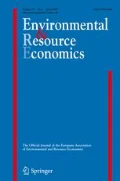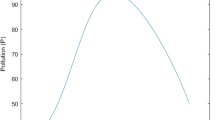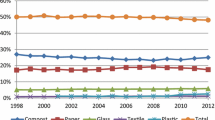Abstract
The paper considers a dynamic model in which an income stream,growing over time, is optimally divided into consumption andexpenditures on waste disposal, the latter being optimally dividedbetween ``recycling''and ``landfilling.'' Recycling is thoughtof as a ``backstop'' waste disposal technology – it does notrequire landfill space but is a relatively expensive method ofwaste disposal. Landfilling uses up scarce landfill capacity. While conserving landfill space is the major reason themunicipality recycles, another motive for recycling might be thatrecycling itself generates utility. Our analysis suggests thatthe optimal recycling program varies considerably with bothlandfill capacity and initial income. For example, richermunicipalities are likely to introduce recycling much earlier inthe planning period than poorer municipalities. Thus whenlegislating recycling, national or regional governments must besensitive to the differences between municipalities.
Similar content being viewed by others
REFERENCES
Choe, C. and I. Fraser (1998), ‘The Economics of Household Waste Management: AReview’, Australian Journal of Agriculture and Resource Economics 42(3), 269–302.
Conrad, K.(1999), ‘Resource and Waste Taxation in the Theory of the Firm with Recycling Activities’, Environmental and Resource Economics 14, 217–242.
Endress, L. H. and J. A. Roumasset (1994), ‘Golden Rules forSustainable Resource Management’, The Economic Record 70, 267–277.
Fleming, W. H. and R.W. Rishel (1975), Deterministic and Stochastic Optimal Control. New York: Springer-Verlag.
Goddard, H. C. (1995), ‘The Benefits and Costs of Alternative Solid Waste Management Policies’,Resources, Conservation and Recycling 13, 183–213.
Highfill, J. and M. McAsey (1997),‘Municipal Waste Management: Recycling and Landfill Space Constraints’, Journal of Urban Economics 41, 118–136.
Huhtala, A. (1999), ‘Optimizing Production Technology Choices: ConventionalProduction vs. Recycling’, Resource and Energy Economics 21, 1–18.
Huhtala, A. (1997), ‘A Post-Consumer Waste Management Model for Determining Optimal Levels of Recycling and Landfilling’, Environmental and Resource Economics 10, 301–314.
Nestor, D. V. and M. J. Podolsky (1998),‘Assessing Incentive-Based Environmental Policies for Reducing Household Waste Disposal’, Contemporary Economic Policy 16, 401–411.
Prell, M. A. (1996), ‘Backstop Technology and Growth: Doomsday orSteady State?’, Journal of Environmental Economics and Management 30, 254–264.
Seierstad, A. andK. Sydsaeter (1987), Optimal Control Theory with Economic Applications. Amsterdam: North-Holland.
Slingerland, S. and P. De Jong (1998), ‘Reduction of Waste and Electricity Demand in the Netherlands: AHypothetical Intervention’, Journal of Environmental Planning and Management 41(2), 195–208.
Sterner, T. and H. Bartelings (1999), ‘Household Waste Management in a Swedish Municipality:Determinants of Waste Disposal, Recycling and Composting’, Environmental and Resource Economics 13, 473–491.
Tiller, K. H., P. M. Jakus and W. M. Park (1997), ‘Household Willingness to Pay forDropoff Recycling’, Journal of Agricultural and Resource Economics 22, 310–320.
Tucker, P. (1999),‘Normative Influences in Household Waste Recycling’, Journal of Environmental Planning and Management 42(1), 63–82.
Author information
Authors and Affiliations
Rights and permissions
About this article
Cite this article
Highfill, J., McAsey, M. Landfilling Versus ``Backstop'' Recycling When Income Is Growing. Environmental and Resource Economics 19, 37–52 (2001). https://doi.org/10.1023/A:1011158511648
Issue Date:
DOI: https://doi.org/10.1023/A:1011158511648




